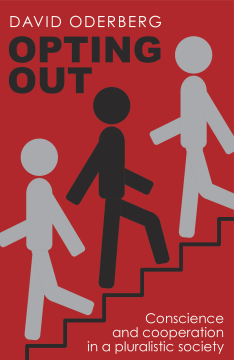
Additional Information
Book Details
Abstract
Should people with deeply held objections to certain practices be allowed to opt out of involvement with them? Should a Christian baker who objects to homosexuality be allowed to deny service to a customer seeking a cake for a gay wedding? Should a Catholic nurse be able to refuse to contribute to the provision of abortions without losing her job? The law increasingly answers no to such questions. But David Oderberg argues that this is a mistake. He contends that in such cases, opting out should be understood as part of a right of dissociation – and that this right needs better legal protection than it now enjoys.
Table of Contents
| Section Title | Page | Action | Price |
|---|---|---|---|
| here | 33 | ||
| _GoBack | 127 | ||
| The author | x | ||
| Acknowledgements | xi | ||
| Summary | xii | ||
| 1\tIntroduction | 1 | ||
| Brief background to this book | 1 | ||
| Overview of topics covered\t | 9 | ||
| 2\tThe attack on freedom of conscience | 19 | ||
| The Obamacare mandate | 19 | ||
| The UK midwives | 20 | ||
| Canadian euthanasia | 22 | ||
| The EU versus conscience | 22 | ||
| Weddings, adoptions, holidays, operations | 24 | ||
| 3\tThe state of the law: unclear and inadequate | 28 | ||
| UK: freedom of conscience needs a microscope | 28 | ||
| The law is a mess | 33 | ||
| Participation is not enough | 36 | ||
| 4\tLaw needs philosophy: ethical principles of cooperation | 40 | ||
| How might you act wrongly? Let me count the ways | 40 | ||
| Types of cooperation | 43 | ||
| Dispensability | 46 | ||
| Proximity | 48 | ||
| Balancing goods and bads | 50 | ||
| Should you sign? It depends | 65 | ||
| 5\tApplication to contested cases | 69 | ||
| Hobby Lobby: what it got right, what it got wrong | 69 | ||
| Zubik v. Burwell: an opt-out or a trigger? | 73 | ||
| Doogan and Wood cannot stand | 77 | ||
| Equality Acts and regulations: a charter for inequality | 81 | ||
| 6\tFreedom of conscience: how far can it go? | 86 | ||
| Pluralism to the rescue? | 86 | ||
| Freedom of dissociation | 94 | ||
| When monopoly is coercion | 103 | ||
| The Satanist nurse | 105 | ||
| Sex and race | 107 | ||
| What kind of society? | 110 | ||
| 7\tPolicy guidelines: time for parliaments and courts to take notice | 115 | ||
| How to take freedom of conscience seriously without harming others | 115 | ||
| Does the UK need a Religious Freedom Restoration Act? | 119 | ||
| General statutory guidelines | 121 | ||
| The role of case law | 123 | ||
| Sincerity is not enough | 125 | ||
| Conclusion | 128 | ||
| References | 130 | ||
| About the IEA | 136 | ||
| Blank Page | ii |
